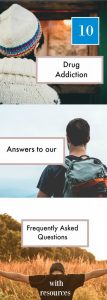Addiction Questions and Answers
Drug and alcohol abuse are chronic diseases that rip through families. Addiction takes down everything in its path. Once in a while, I will talk to someone, who insists that their substance abuse is not hurting anyone. This is because they isolate while under the influence. This is a myth. At the very least, you’re a negative presence in the world and denying society your value and talent.
Drug and alcohol abuse makes everyone sick. It’s hard to be objective. In addition, drug and alcohol problems are confusing subjects. You’re going to have a lot of questions. Find answers to 10 of our frequently asked questions below.
Can you legally force a family member into rehab?
We get this question a lot. The short answer is no. However, it varies by state. In some states, you can never legally force a person into rehab. This is different from mental illness. In this instance, you actually can commit someone if they are a threat to themselves or to others. It’s not a fast or easy process.
In most situations, we find that the person is willing to go to rehab, at least at first. But they quickly change their mind. This happens because they start experiencing withdrawal symptoms and start craving drugs or alcohol. Panic and withdrawal kick in.
However, we are prepared for this and guide families through the process. We got this covered — it happens all the time. We make sure everything is done to keep the loved one in the rehab.
How can I find the right drug rehab center?
This is a big and important question. There are so many things to consider. That’s why we work with all types of rehabs. In our experience, the biggest battle is getting a commitment from the person with the addiction. Concentrate on that and allow experts to use experience and skill.
It is the willingness that will determine the success of recovery. Just get started on the process, and let a placement specialist take care of the rest.
How long will a person have to stay in a rehabilitation center?
That depends on a few factors. Most will stay for a few days in detox and continue to inpatient treatment for at least 30 days. Staying for 90 days is better. This will depend on your lifestyle, insurance, and family commitments.
If a person has been to rehab before and they’ve had a relapse, I suggest traveling out of state or stay in a long-term facility. Many times getting away from the “triggers” make recovery much easier.
Long-term is what you want to shoot for. That generally means anything longer than one month.
Will a drug treatment facility prescribe me medication?
That depends on the detox process and any mental health issues that are co-occurring with the addiction. Co-occurring conditions are sometimes referred to as dual-diagnosis.
When you leave, a drug treatment center may send you out the door with short-term prescriptions. That’s so you can go see your general doctor and get a proper prescription. So generally you need to go see a doctor outside of drug rehab in order to be put on a permanent prescription.
What percentage of addicts are cured by rehab services or treatment?
Addiction is tough to recover from. It’s a chronic disease. Beware of places that give a “sober guarantee” or a percentage of success rate. It is very difficult to get an accurate number. This’s because addiction is a long-term disease. You would literally need to track the rehab participants for the rest of their lives to find out the success. For us, a lifetime of sobriety is the goal.
 Don’t get discouraged. Lots of us have double-digit sobriety. That’s because it’s worth it!
Don’t get discouraged. Lots of us have double-digit sobriety. That’s because it’s worth it!
When we place people in the right rehab for the correct amount of time, we are dazzled by the results. Don’t give up hope.
What should the family do, in order to help in the treatment process?
Find an Al-anon meeting. They’re everywhere. It’s a fellowship that helps the family dealing with the disease of drug and alcohol addiction. Find one in your area and go to it. Share openly and honestly with the people there. It’s not a self-help group. It’s a help each of so we can be empowered, group.
Talk with the people who run the meeting. Explain to them your situation and what you are going through. Ask for their advice and support. This is the best way to deal with things when you have a loved one in treatment. What do you have to lose?
Also, participate in any family programs that the rehab might offer. Call them up and see if they have one. Most do.
How can a person who has low income find a good addiction treatment program?
Give us a call, we will offer a solution. We have access to a variety of no-cost rehab options. You can also go to SAMHSA. It a free government service that has a no-cost treatment finder.
Other than that, get out your phone, get on the internet, and start calling. Start with local rehabs and treatment centers. Call them up, tell them what you have (money, insurance, Medicaid, Medicare, no insurance at all, whatever) and that you need help for addiction.
If you are in the US, you will find help, almost regardless of your funding situation. Check out Medicaid. Look into the Salvation Army. Look at local churches for help. Persistence is key. And, be nice. Be desperate. Keep asking questions.
Is detoxification necessary when treating alcohol problems?
Yes. If you drink heavily, every day, quitting abruptly is very dangerous. Everyone who is quitting alcohol has to detox from the drug. That simply means that the alcohol is going to leave their body. There may or may not be withdrawal symptoms when this happens.
It’s not something you want to take a chance with. Allow the medical professionals help. Depending on many factors, detox symptoms could be very minor, or they could be extremely dangerous. That means that the person could die if they stop drinking. Many people don’t realize that alcohol withdrawal can be fatal.
So the bottom line, go to rehab and seek detox if you are quitting alcohol. It’s hard to know how bad your withdrawal will be.

If you have ever been through detox before, realize that every time you detox after that, your symptoms will always get worse. They never get better. That is part of the progression of the disease.
What are the usual drugs and medications that can treat heroin or opiate addiction?
Fortunately, there are several options. When you go to the detox center they will likely treat your withdrawal with something like Suboxone or Subutex. But some places use a combination drugs. They might also give you medications to help with the symptoms of opiate withdrawal. The symptoms are stomach cramps, sweating, and anxiety.
There will be a thorough intake process, so treatment will be individualized for each person.
Why do I need to stay in an Inpatient Rehab?
The short answer is because it works. And it works because there are tons of benefits. The biggest one is that if you actually stay clean and sober, in a safe environment.
Your whole life will change for the better and you get a fresh start on life. In order to make that happen, you need the care of a safe environment during rehab. A treatment center is a perfect drug and alcohol-free safe place. But you also get the support of other people who are going through the same problems.
The small group and individual therapy are immensely helpful. You will probably also be introduced to some form of sober fellowship like 12-step meetings. This will be important for when you leave the rehab. You will need to change almost everything in your life. Having a support base will make it easier.
Finally, it’s super important to get away from your old friends and drug dealers. It’s really hard to deal with pressure from your drug-using circle.
If you don’t really want to be sober, then none of these are really going to help. But for anyone who is serious about recovery, rehab is a great place to start their journey.
What is drug addiction?
My final answer comes from the National Institute on Drug Abuse (NIDA)
Addiction is a complex, and often chronic, brain disease. It is characterized by drug craving, seeking, and use that can persist even in the face of devastating life consequences. Addiction results largely from brain changes that stem from prolonged drug use—changes that involve multiple brain circuits, including those responsible for governing self-control and other behaviors. Drug addiction is treatable, often with medications (for some addictions) combined with behavioral therapies. However, relapse is common and can happen even after long periods of abstinence, underscoring the need for long-term support and care. Relapse does not signify treatment failure, but rather should prompt treatment re-engagement or modification. For more information, see “Drugs, Brains, and Behavior – The Science of Addiction.”
If you have other questions, just pick up the phone. We really enjoy taking calls and sharing our experience, with people who are suffering from this epidemic.
One final note. If you have someone in your life, who is abusing drugs it’s possible you are causing them more harm than you think. Check your motives by looking outside of yourself. I know this is hard to do. However, you could be enabling your loved one and this can be dangerous or deadly. Remeber, you don’t have to go through this alone.
SaveSave
SaveSave
SaveSave
SaveSave
SaveSave
SaveSave
